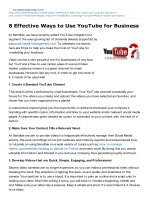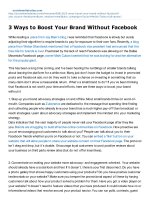3 Ways to Boost Your Brand Without Facebook
Bạn đang xem bản rút gọn của tài liệu. Xem và tải ngay bản đầy đủ của tài liệu tại đây (59.11 KB, 2 trang )
socialmediat oday.com
/>utm_source=feedburner&utm_medium=email&utm_campaign=Social+Media+Today+(all+posts)
3 Ways to Boost Your Brand Without Facebook
While reading a piece from Jay Baer’s blog, I was reminded that Facebook is slowly but surely
adjusting their algorithm to require brands to pay for exposure to their own fans. Recently, a blog
piece from Weber Shandwick mentioned that a Facebook vice president had announced that the
free ride for brands is over. Frustrated by the lack of reach Facebook was allowing on the Dallas
Mavericks Facebook page, owner Mark Cuban tweeted t hat he was looking for another alternative
for the popular giant.
This has been a long time coming, and I’ve been hearing the rumblings of smaller brands t alking
about leaving the plat form for a while now. Many just don’t have the budget to invest in promoted
posts and Facebook ads, nor do they want to take a chance on investing in something that so
many claim don’t show a measurable return. What’s a small brand to do? If you’ve been thinking
that Facebook is not worth your time and efforts, here are three ways to boost your brand
without it
1. Step up your brand advocacy strategies on and offline. Most small brands thrive on word-of-
mouth. Companies such as Zuberance are dedicated to the message t hat spending time f inding
and cultivating people who already love your brand has a much higher pay-off than broadcast or
reach strategies. Learn about advocacy strategies and implement the mindset into your marketing
strategy.
Data indicates that the vast majority of people never visit your Facebook page after t hey like
you. Brands are struggling to build effective online communities on Facebook. How proactive are
you at encouraging good customers to talk about you? People can talk about you to their
Facebook friends whether you’re on Facebook or not. You can embed a “like” button on your
website that will allow people to share your website content on their Facebook page. The protocol
isn’t drag and drop, but it’s doable. Encourage loyal cust omers to post positive reviews about
your business on third party review sites (but do not offer incentives).
2. Concentrate on making your website more advocacy- and engagement -oriented. Your websit e
should already have a social look and feel. If it doesn’t, there is your first disconnect . Do you have
a phot o gallery that shows happy customers using your products? Do you have positive customer
testimonials on your website? Make sure you temper the promotional aspect of these by having
cust omers talk about how your product solved a problem for t hem. Have you got a video player on
your website? It doesn’t need to feature videos that you have produced. It could include how-to or
informational videos that revolve around your product sector. You can run polls, contests, guest
blogs, story-telling micro sites, and many other customer-oriented features on your website. The
more you can get people coming to your website engaging and sharing with others the less you
need to worry about Facebook.
3. Experiment and engage more with other social media channels. If you have a walk-up storefront,
have you tried geo-locat ion social media yet such as Foursquare? Have you claimed all your online
business profiles? How about adding a blog to your website? If you don’t have a website, how
about putting up a free “website” on a platform such as Wordpress.com or Tumblr that has the
interactive look and feel of Facebook? Do some research on other social media channels like
Twitter, YouTube, Pinterest, or Google Plus. Experiment and see where you get some traction.
Make sure you apply good engagement strategies wherever you go. Take some time to school
yourself on engagement strategies.
Even t hough Facebook claims to have a billion users, gett ing the attent ion of the fans you need
to reach is a diff icult task, and now, possibly an expensive one. Brands have alternat ives. You can
be successful at creating loyal brand advocates without Facebook. Maybe it’s time to consider the
alternatives. What do you think? Do you need Facebook to thrive?
Connect:
Authored by:
Chris Syme
Consultant in crisis communications and social media strategy. Specializing in higher ed,
organizations, nonprofit s, and small business. Author of Listen, Engage, Respond available
on amazon.com
Chris has 25+ years in the communicat ions industry and has authored research for the
Council for Advancement of Education (CASE) and the College Sports Information Directors
of Americs (CoSIDA). She is
See complete profile
Would you like to contribute to this site? Get started »









